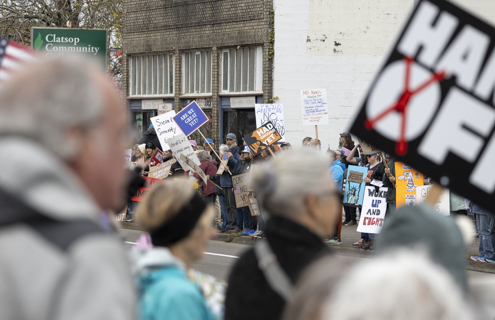Gearhart police scale back mental health crisis response
Published 4:30 pm Tuesday, January 19, 2021

- Gearhart Police Chief Jeff Bowman has drawn a line on mental health response calls.
GEARHART — Drawing a line between law enforcement and crisis response, Police Chief Jeff Bowman announced that his officers will no longer be the first responders to mental health calls unless there is an imminent threat of physical harm to others.
In a letter to Mayor Paulina Cockrum and the City Council on Monday, the police chief said the social services community should step up and take an active role when people report a mental health crisis or reach out to a suicide hotline.
“The first call should be to social services, not the police,” Bowman said in an interview.
Bowman said only when a subject in a mental health crisis is imminently in harm’s way will police respond. “Is the subject running around the Grocery Outlet parking lot with a machete, or is he sitting there talking to himself?” he asked.
Bowman issued the directive in response to a January incident in Killeen, Texas, when a police officer, dispatched to a family home during a mental health crisis, ended up fatally shooting a man in his front yard. The family has complained that the officer was not equipped to handle the situation and has called for the officer to be fired and arrested.
“Why was this officer dispatched at all, and why did the command staff allow this officer to respond?” Bowman asked.
Bowman emailed the directive “as a head’s up why we may or may not respond” to Seaside police and Clatsop Behavioral Healthcare, Clatsop County’s mental health contractor.
Police and sheriff’s deputies can ask mental health experts for guidance when responding to calls involving people in crisis, but, in practice, a lack of funding and resources has kept the outreach from being a more effective tool.
Fatal encounters
The county has struggled for decades to provide adequate services for people in crisis, a challenge often compounded by alcohol and drug abuse. Over the past year, two people believed to be suffering from mental health difficulties have been killed after interactions with police.
Last April, Alexander Jimenez, a 34-year-old Warrenton man, died after police used a Taser to subdue him during an arrest and he wrestled with sheriff’s deputies and police at the county jail. The state medical examiner ruled that Jimenez, who reportedly had schizophrenia, died from the toxic effects of methamphetamine.
In December, Alaina Burns, a 31-year-old Astoria woman, was shot and killed by an Oregon State Police trooper after reportedly brandishing a gun after breaking into a home near Sunset Beach. Friends of Burns’ family said she struggled with drug addiction and mental illness.
Amy Baker, the executive director of Clatsop Behavioral Healthcare, said she wanted to meet with Bowman to discuss the issue further.
“Our current model relies on a co-response with law enforcement,” Baker said. “We typically go to situations with law enforcement. If the situation is safe, we will take the lead in working with someone who is experiencing psychological distress.
“We agree that it is ideal to have behavioral health professionals respond to behavioral health crisis. However, we are not equipped to be the sole responder in situations such as when weapons might be involved; if the person is agitated or threatening harm to self or others and the person is unable to engage in conversation.
“Additionally, we are not equipped to transport people safely if they require assistance at an emergency department, and with law enforcement on scene, they are able to summon that assistance in an expedited manner.”
Baker cited Lane County’s CAHOOTS program as a potential model. Teams with a medic and crisis worker often respond to calls involving mental health, addiction and homelessness.
“While we are excited by this model and can see the benefits of its application in our area, this simply cannot become a reality in our county without the funding to go with it,” she said.
Funding a challenge
Seaside Police Chief Dave Ham said police will not follow Gearhart and change responses to similar calls for service in Seaside.
Seaside police are not expected to respond to calls in Gearhart, and Bowman’s directive will not change Seaside’s response coverage to assist them when needed. Seaside’s dispatch center will continue to advise Gearhart police of calls for service in their jurisdiction.
Cockrum said she and Bowman have had discussions about police reform over the past year.
“I have reviewed and he has revised the Gearhart Police Department procedures on use of force, but not specifically through the lens of mental health,” the mayor said. “I have asked him to add a procedure with contact information for the public on what to do if they are faced with a mental health crisis.”
Cockrum proposed consideration of city funding in the next budget cycle for social service providers to assist in responding to people experiencing a mental health crisis.
Regardless of the response from other agencies, Bowman said he recognizes he is “just one person taking on bureaucracy.”
He said he’s willing to shoulder that responsibility.
“I’m not going to end my career with one of my officers or myself in a case like this Texas case,” he said.
Bowman said he hopes his letter will inspire other jurisdictions to address police response to mental health care, ultimately leading to a change in law enforcement procedures in the state.
“Having a mental health condition is not a crime,” Bowman said. “And these subjects should not be treated as such. We have a duty to protect all lives and sometimes that task is best done by not doing. We’re not psychologists. Let the professionally trained individuals handle these noncriminal calls.
“It is time for the social services community to step up and start taking an active role,” Bowman wrote in his letter. “There has been legislation calling for change, court rulings calling for change and society calling for change. Why isn’t there a sweeping reform across the U.S. within law enforcement agencies to end the practice of law enforcement officers being the first response to these types of calls?
“My guess, the political bodies of cities and counties are not addressing these mental health needs.”





